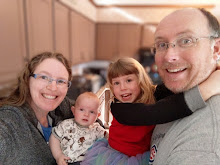Our first morning in Cameroon we got up bright and early for breakfast and then we were ready to meet our taxi driver, Moses at 8:30 AM so that we could get some local currency and some grocery items for the next day's travel and for our travel companions that would come in that night. Except our taxi driver didn't show up. He was an hour late and we found someone who could call him for us. We found out first that he was no where in the city and then that his 8 year old daughter had just passed away and so he was driving to be home with his family. We soon heard new plans that another driver, Paul would pick us up to do our errands that afternoon. We spent the rest of the morning resting and checking out the street and vegetable vendors near us, but not purchasing anything since we didn't have any money yet.
Moses was also going to drive us all the way to Central African Republic the next day in a van. So our hosts, Aleta and Roy D. arranged for 2 taxis from the Cameroon / CAR border to bring up one missionary family and then return with us the next day. Unfortunately, neither of them spoke English, but at least we had a ride! At this point I realized how much of a mission trip this was where all the carefully laid out plans have to be changed. Flexibility is always a must in missions!
After running errands in the afternoon, we met up with our new taxi drivers that night, and all was arranged for a 5 AM departure the next day. Then the other three men, Dave, Eric and Mark who represented the project's mission agency, a support agency and a supporting church arrived from the US. They would have a short night, and Roy and I were thankful for the extra day we had to rest.
 |
| These are the 3 men who joined us for the first 4 days, along with our missionary host, Roy D (right) |
Our 5 AM came soon and we packed up and were off. We were driving on the last day of Ramadan (month of fasting for Muslims) and so our groceries were helpful so that we didn't have to hunt for restaurants that would be open. We made super good time driving across country. The roads went from beautiful smooth pavement to gravel to rough gravel and then after crossing the border they went to rough dirt roads.
 |
| Sunrise on the way out of Yaounde on nice paved roads |
 |
| onto the gravel road which was mostly smooth |
 |
| This is the main road (dirt) once we crossed into CAR. |
I was impressed that Musa, our taxi driver even stopped at gas stations where there were real bathrooms (a luxury I did not expect). Roy and I both compared the countryside to the parts of Africa we had been in the past. Cameroon was much greener than Senegal where Roy had lived, and I noticed a lot less animals, especially donkeys, and many more motorcycles on the road as compared with Ethiopia. There were also a lot of check points where sometimes they would wave us on and sometimes they would check our passports and ask questions and a couple times ask for things. We made it to the border town of Kentzou on the Cameroon side by 2 PM, and Roy D met us and picked us up to take us across the border. More security checks, and it took a couple hours to get through all of them with all five of us visitors.
Then we arrived at our destination, CEFA which is a project farm (NGO or non-government organization). It stands for Center for Education and Formation of Agriculture and is located 5 km from the small town of Gamboula, CAR. It is basically a training and demonstration farm set up to help people improve their lives by improving their farming.
 |
Almost out to the CEFA farm!
|
We would call this home and stay in a guest house here for the next couple weeks. We got to shower off the road dust (of which there was a lot since we didn't have any air conditioning) and we foreigners (especially pregnant ones) want the windows down to keep it cool. Our driver would have preferred a hot car free of dust! Then we were fed a hot delicious spaghetti supper and planned out the next day.
 |
| The guesthouse where Roy and I stayed at the CEFA farm. |
 A typical day will see 2-3 flat bed trucks bring as many as
100 people to work at the farm for the day.
Everyone is dropped off at the front gate where a morning devotion is
led by either Roy D or one of the farm managers. These are shared in Sango, the local trade
language.
A typical day will see 2-3 flat bed trucks bring as many as
100 people to work at the farm for the day.
Everyone is dropped off at the front gate where a morning devotion is
led by either Roy D or one of the farm managers. These are shared in Sango, the local trade
language.




























